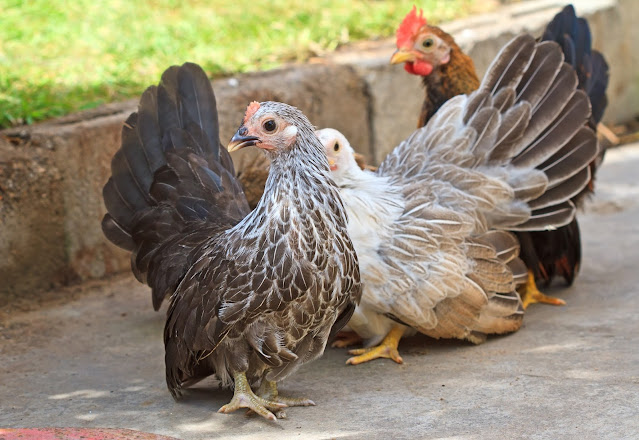Among the many decisions you'll face, one of the fundamental choices is between bantam chickens and standard (regular) breeds. Each type brings its own set of advantages and considerations, tailored to different preferences and lifestyles. Let's dive into the pros and cons of both bantam and standard chickens to help you make an informed decision on bantam vs standard chicken.
Bantam Chickens: Small in Size, Big in Personality
Pros:
Size: Bantam chickens are smaller than standard breeds, making them ideal for smaller yards or urban settings where space is limited. Their compact size also makes them easier to handle and manage.
Foraging Abilities: Bantams are known for their agility and excellent foraging skills. They are adept at finding their own food in the yard, which can reduce feeding costs and mimic a more natural diet.
Eggs: While bantam eggs are smaller than those of standard chickens, they are often richer in flavor. Some owners appreciate their smaller size for culinary purposes or smaller households.
Personality: Bantams are often described as spirited and lively. They can be friendly and interactive with their owners, adding charm and entertainment to the backyard.
Broodiness: Many bantam breeds are excellent mothers, exhibiting strong maternal instincts. They may be more inclined to brood and hatch eggs naturally, which can be beneficial if you're interested in breeding or expanding your flock.
Cons:
Egg Production: Bantams generally lay fewer eggs compared to standard breeds. If you rely heavily on eggs for consumption or sale, you may find their lower production rate less economical.
Size of Eggs: While their eggs are flavorful, they are smaller in size. This may not be suitable if you prefer larger eggs for cooking or baking purposes.
Vulnerability: Due to their smaller size, bantams can be more vulnerable to predation. You'll need to ensure their coop and yard are secure to protect them from potential threats.
Availability: Some bantam breeds are less common or harder to find compared to standard breeds. Finding specific varieties may require more effort or research.
Standard Chickens: Reliable and Productive
Pros:
Egg Production: Standard chickens are renowned for their egg-laying capabilities. They typically produce larger eggs and lay more consistently throughout the year, making them a reliable source of fresh eggs.
Size of Eggs: Their eggs are larger in size, which can be advantageous for culinary uses or households with higher egg consumption.
Versatility: Standard breeds come in a wide variety of sizes, colors, and temperaments, offering choices that can fit specific preferences or purposes, such as meat production or exhibition.
Availability: Standard chicken breeds are widely available from hatcheries and breeders, making it easier to find and acquire specific breeds or varieties.
Resilience: Standard chickens tend to be hardier and more resilient against harsh weather conditions and predators due to their larger size and more robust build.
Cons:
Space Requirements: Standard chickens require more space than bantams, both in the coop and in the yard. They may not be suitable for smaller urban environments or confined spaces.
Feeding Costs: Larger chickens consume more feed compared to bantams. This can increase your overall expenses, especially if you have a sizable flock.
Handling Difficulty: Their larger size can make them more challenging to handle, especially for children or those new to chicken keeping.
Broodiness: While some standard breeds are good mothers, others may exhibit less broodiness compared to certain bantam breeds.
Which One Fits Your Lifestyle?
Choosing between bantam and standard chickens ultimately depends on your specific needs, preferences, and the environment in which you'll be keeping them. If you have limited space, enjoy smaller eggs with richer flavors, and value their foraging abilities and friendly personalities, bantam chickens may be the perfect fit for you in the bantam vs standard chicken comparison. On the other hand, if you prioritize egg production, larger egg sizes, and resilience against predators, standard chickens offer reliability and versatility in the bantam vs standard chicken debate.
At Casa De Chicka, we celebrate the diversity of chickens and recognize that each type brings its own unique contributions to a backyard flock. Whether you opt for the agility and charm of bantams or the productivity and resilience of standard breeds, both types can enrich your life with fresh eggs, companionship, and the joy of raising poultry.

Comments
Post a Comment